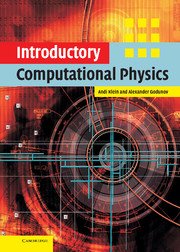Book contents
- Frontmatter
- Contents
- Preface
- 1 Introduction
- 2 Basics
- 3 Short introduction to Linux
- 4 Interpolation
- 5 Taking derivatives
- 6 Numerical integration
- 7 Solution of nonlinear equations
- 8 Differential equations
- 9 Matrices
- 10 Random processes and Monte Carlo simulation
- References
- Appendix A The ROOT system
- Appendix B Free scientific libraries
- Appendix C FORTRAN and C++
- Appendix D Program listings
- Index
10 - Random processes and Monte Carlo simulation
Published online by Cambridge University Press: 04 August 2010
- Frontmatter
- Contents
- Preface
- 1 Introduction
- 2 Basics
- 3 Short introduction to Linux
- 4 Interpolation
- 5 Taking derivatives
- 6 Numerical integration
- 7 Solution of nonlinear equations
- 8 Differential equations
- 9 Matrices
- 10 Random processes and Monte Carlo simulation
- References
- Appendix A The ROOT system
- Appendix B Free scientific libraries
- Appendix C FORTRAN and C++
- Appendix D Program listings
- Index
Summary
Random processes in science
In science as well as in everyday life we constantly encounter situations and processes which are stochastic in nature, i.e., we cannot predict from the observation of one event how the next event with the same initial starting conditions will come out. Say you have a coin which you throw in the air. The only prediction about the outcome you can make is to say that you have a 50% chance that the coin will land on its tail. After recording the first event, which was a head, you toss it up again. The chance that the coin will land on its tail is still 50%. As every statistics teacher has taught you, you need to execute these throws a large number of times, to get an accurate distribution. The same is true when you roll a die. The only prediction you can make is that in a large number of throws each number has a probability of 1/6. Now assume that you have 10 dice, and you are to record all distributions in 10,000 throws. Of course probability theory will predict the outcome for any combination you wish to single out; for example, the chances to get all “ls” in one throw (1/6). However, actually trying to do this experiment would keep you busy for quite some time (and in addition you would not learn anything new).
- Type
- Chapter
- Information
- Introductory Computational Physics , pp. 89 - 104Publisher: Cambridge University PressPrint publication year: 2006



